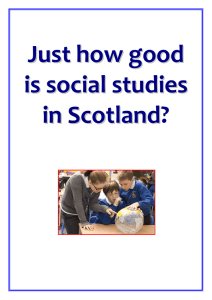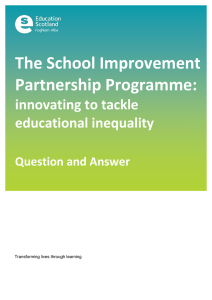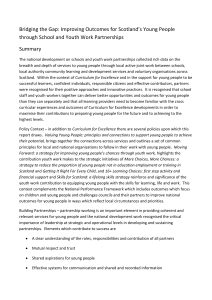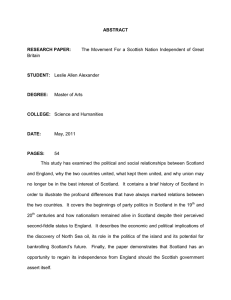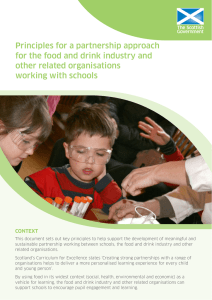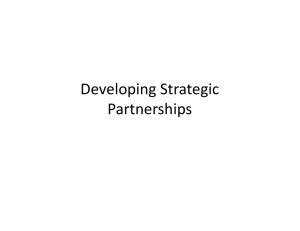The School Improvement innovating to tackle educational inequality
advertisement
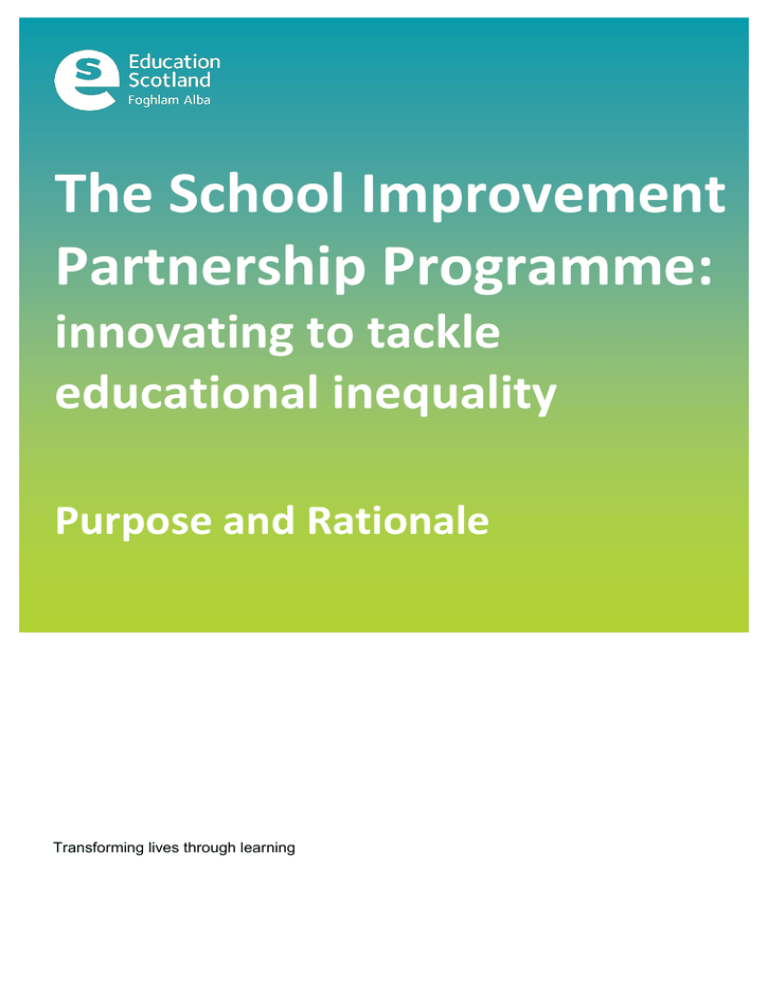
The School Improvement Partnership Programme: innovating to tackle educational inequality Purpose and Rationale Transforming lives through learning Contents 1. Background 3 2. What is the rationale for the programme? 3 3. Core principles that underpin the School Improvement Partnerships Programme 4 4. Assessing the impact of School Improvement Partnerships 4 5. Summary 5 2 Background In March 2013, the Cabinet Secretary for Education and Lifelong Learning announced a range of approaches to tackle the steadfast link between socioeconomic deprivation and low educational attainment. He stressed the importance of partnership working as a solution focused approach to achieving this. The selfimproving schools partnership programme is an aspect of this solution-focused approach to Scotland’s attainment issues. Education Scotland has been asked to lead the development of this programme and manage its implementation. This document is the first stage of the project and is the result of partnership working with ADES, COSLA, AHDS, SLS, EIS and the Scottish Government. It provides important information about the self-improving schools partnership programme including how it will operate and what it is trying to achieve. It is intended to support discussion between interested schools, their local authority and Education Scotland. It should help schools decide whether they wish to be considered for the programme. Some funding support is available to support this programme. What is the rationale for this programme? This programme draws on the wealth of international educational research and practice demonstrating that the most effective school improvements are locally owned and led by teachers and school leaders working in partnership and collaboration with like-minded professionals. The best examples tend to align this so called “bottom up” approach with national co-ordination. Where there is a shared commitment to improving outcomes for all children and young people, well supported partnerships can lead to significant and sustained improvement and raised attainment. Long term partnerships where schools tackle issues of mutual concern brings mutual success – especially where this forms part of existing improvement planning. The fundamental beliefs that underpin this programme are the following. The Scottish education system has untapped capacity to improve itself. Strengthening partnership and collaboration between schools and across local authorities is crucial to releasing this potential. Schools and their partners have the expertise and experience to tackle the challenging circumstances they find themselves in by sharing and working together. Schools and partner agencies working together can promote an even deeper understanding of their collective responsibility to Scotland’s children and young people. The programme is about systemic improvement of education provision that provides opportunities, through the Programme, for spread and sustainability beyond the individual partnerships. The programme will support the implementation of other national priorities including Teaching Scotland’s Future and Curriculum for Excellence. 3 Core principles that underpin the School Improvement Partnerships Programme The core principles that underpin this programme are the following. Partnership working across schools and local authorities with a focus on exploring specific issues relating to educational inequity. The use of Action Research and evidence to identify key challenges, experiment with innovative practices and monitor developments. The creation of leadership opportunities and professional learning of staff at all levels. A commitment to reciprocity and mutual benefit to all involved. The development of arrangements to support long-term collaboration and new approaches to capacity building. Explicit links to strategic improvement planning in schools and local authorities. The involvement of a diverse range of partners including schools, local authorities, Education Scotland and other agencies. These key principles provide an overarching framework providing coherence across the programme from which systemic lessons can be learned while retaining the flexibility necessary for localities to develop arrangements matched to their specific contexts. Assessing the impact of School Improvement Partnerships The School Improvement Partnerships are an approach based on action research and process of collaborative inquiry. The focus is on building staff confidence and expertise, sharing effective approaches and then trying these out. In the spirit of action research we want to encourage staff to learn from each other, experiment with their practice and monitor and evaluate change. Each partnership will be asked to indicate what success will look like, with a strong focus on impact in making a difference to young people’s achievement and ultimately life chances. The results of the action research in this first year will be shared widely, and will be used to inform how and to what extent this programme may be rolled out in future years. 4 Summary This ambitious programme seeks to harness the professional creativity and innovation that exists within the Scottish education community. The programme provides exciting opportunities to rethink roles and relationships within the system and generate and share new practice to address the intergenerational challenges which have prevented too many of our children from realising their full potential. 5 © Crown copyright, 2012 You may re-use this information (excluding logos and images) free of charge in any format or medium, under the terms of the Open Government Licence providing that it is reproduced accurately and not in a misleading context. The material must be acknowledged as Education Scotland copyright and the document title specified. To view this licence, visit http://www.nationalarchives.gov.uk/doc/open-governmentlicence/ or e-mail: psi@nationalarchives.gsi.gov.uk . Where we have identified any third party copyright information you will need to obtain permission from the copyright holders concerned. Any enquiries regarding this publication should be sent to us at: Education Scotland Denholm House Almondvale Business Park Almondvale Way Livingston EH54 6GA Tel: 01506 600 200 e-mail: enquiries@educationscotland.gov.uk www.educationscotland.gov.uk 6
